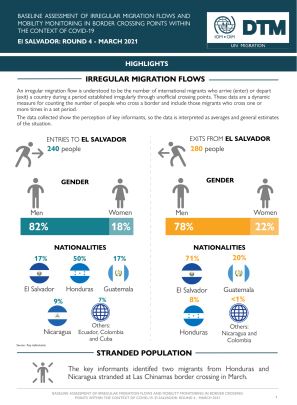-
Countries
-
Data and Analysis
-
Special Focus
-
Crisis Responses
El Salvador-Baseline assesment of migration flows and mobility tracking within the context of COVID-19, Report #4 (March,2021)

Contact
Cecilia Ramirez cramirez@iom.int
Language
English
Location
El Salvador
Period Covered
Mar 01 2021
Mar 31 2021
Activity
- Flow Monitoring Survey
- Baseline Assessment
- Event Tracking
In order to enter El Salvador, travelers must present proof of COVID-19 vaccination (either single- or double-dose, depending on the vaccine). Persons who have not been vaccinated must present a PCR, NAAT, or LAMP Test with negative results.
In March 2021 the Legislative Assembly passed the Special Act against Smuggling of Persons, which establishes the rights of nationals or foreigners who have been victims of smuggling, including the right: to receive protection in accordance with the Special Victim and Witness Protection Act; to receive assistance from diplomatic and consular representatives; and to return to their country of origin or residence in a timely manner. During the same month, however, President Nayib Bukele stated via Twitter that he would veto the Special Act against Smuggling of Persons, as he deemed it to be a tool to criminalize migration.
It was determined that the greatest incidence of irregular migration occurs during the evening and pre-dawn hours, times when people perceive less border monitoring. The key informants identified 82 cases of migrant smuggling between December and March, while one case was identified at El Amatillo location by way of secondary monitoring. The border crossing locations with the highest incidences of migrant smuggling were: La Hachadura, with 28 cases; Chinamas, with 20 cases; and San Cristóbal, with 19 cases.